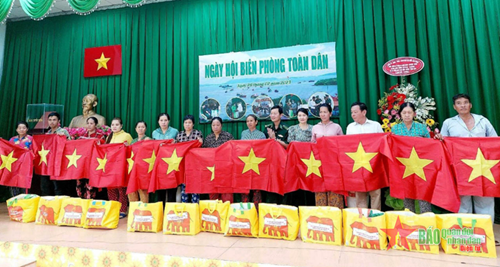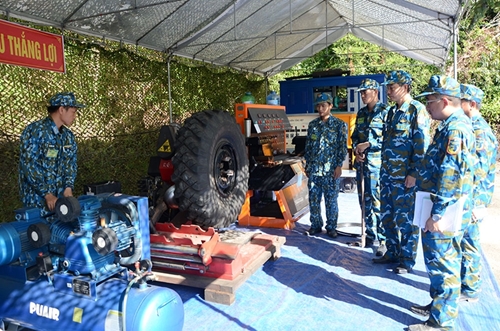Can Thanh townlet in Can Gio district, Ho Chi Minh City houses nearly 100 ships and boats, including many offshore fishing vessels.
    |
 |
|
The Ho Chi Minh municipal Border Guard Command’s troops present national flags to Can Gio fishermen. |
Each day, right from dawn, Can Thanh border guards stay ready at the townlet’s wharf. Reaching each ship or boat, Lieutenant Colonel Phan Huan, Political Commissar of Can Thanh Border Post, provided fishermen with the methods to handle some situations at sea, laws, and measures to observe, detect, identify, locate strange ships and boats, and make notifications and reports.
Tran Hong Phat, owner of trawler SG 37202-TS, said that “having been checked and guided by troops of Can Thanh Border Post, we fell more confident to reach out to the open sea to work, produce, develop economy and contribute to firmly protecting national sovereignty over sea and islands.”
As reported, the Ho Chi Minh municipal Border Guard Command is tasked with managing and protecting national sovereignty and security in sea border areas and a coastline of more than 23 kilometers. In order to give strength to and help fishermen be confident in going fishing offshore, the municipal border guard force has coordinated with relevant departments to effectively implement movements and launch models. So far, the joint forces have maintained 16 “Self-managed safe wharfs” with 138 members, 16 “Self-managed safe teams of ships, boats” with 121 vehicles and 417 members, and 23 “Self-managed security and order teams” with 200 members, among others.
    |
 |
|
Ho Chi Minh City border guards hand over supplies to fishermen of Can Gio district. |
These models have helped disseminate laws to local fishermen, encourage them to build solidarity and mutual support in holding on to the sea and transporting goods. As a result, the fishermen have actively and pro-actively provided valuable information about security situation in different waters, and joined hands with border guards to protect national sovereignty and security at sea.
Moreover, party committees and chains-of-command of units under the command have also assigned border cadres to take charge of households, and help local people in production, hunger eradication and poverty alleviation, and disaster prevention and control. In addition, the city’s border guard force has also mobilized many resources to support fishermen in all aspects, thus practically improving their living standards.
Since early this year, the command has campaigned to build 29 houses of gratitude and compassion, present nearly 3,000 gifts, 30 health insurance cards, 27 bikes, 100 lifebuoys, and 6,300 national flags with a total value of VND 8.1 billion to policy beneficiaries, and needy people living in sea border areas. Additionally, its units have kept their forces and vehicles ready for search and rescue operations at sea. In particular, over 100 troops and 22 vehicles of the command have cooperated with other forces to save 34 people in 22 ship and boat accidents.
The municipal border guard command is actually a firm fulcrum for fishermen to reach out to the open sea for fishing, developing economy, and contributing to the firm safeguarding of national maritime sovereignty.
Translated by Mai Huong